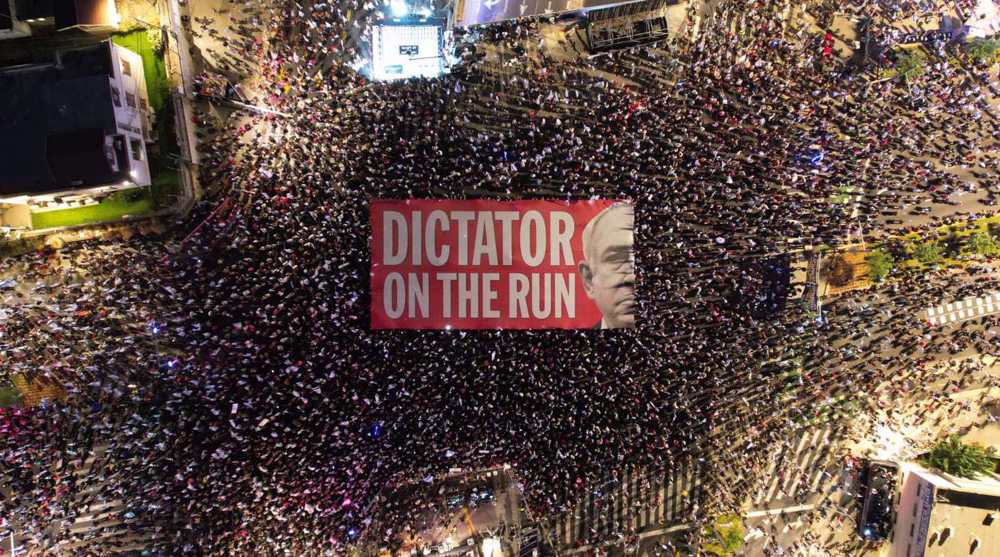
Tens of thousands of demonstrators have held protest rallies across the occupied Palestinian territories for the 38th consecutive week, condemning the policies of the regime’s far-right cabinet.
As was the case in previous weeks, the coastal city of Tel Aviv was the epicenter of Saturday protest in which demonstrators slammed the extremist policies of Prime Minister Benjamin Netanyahu’s far-right cabinet, including the highly controversial judicial overhaul scheme.
According to organizers, demonstrations were held at approximately 150 locations across the occupied territories, including the city of Haifa.
This week’s protests came following Netanyahu’s speech at the 78th session of the United Nations General Assembly.
The protesters accused Netanyahu of fleeing to the United States to avoid a corruption cases against him as well as the mass protests that have been prompted by his so-called overhaul scheme.
In Tel Aviv, protesters wore shirts reading "Save us from Netanyahu" and held up signs reading "Crime Minister."
"The world should know that whatever they hear from our Prime Minister … everything that he says is a lie. He’s trying to blind everyone else and when he comes back here, then he goes back to his try to save his skin and he’s … fighting … only for himself, and the world doesn’t know it,” a protester told AFP.
"We’re here together with tens of thousands … and we come here in the hope that we can make a difference. Each one of us being here, saying 'we don’t approve’ … and we will be back here every week until there’s a change," another protester said.
The protests have been a fixed weekly event since January, when Netanyahu announced the overhaul scheme, which seeks to rob the regime's Supreme Court of the ability to invalidate the decisions made by the politicians.
The scheme has galvanized the largest protest movement the regime has faced in its history.
Faced with overwhelming public pressure, including weekly protests, a wave of industrial actions, and rising opposition among the regime’s military ranks, Netanyahu’s cabinet has passed only one of the scheme’s bills through the Knesset. The bill removed the Israeli Supreme Court's power to strike down government decision's or appointments on the basis of being "unreasonable."
Netanyahu’s far-right cabinet, however, has pledged to push ahead with the rest of the scheme.
Proponents of the overhaul say it helps redistribute the balance of power between the politicians and the judiciary. Its opponents, however, accuse Netanyahu of trying his hand at a power grab. They say the premier, who is on trial in three corruption cases for receiving bribe, fraud, and breach of trust, is also attempting to use the scheme to quash possible judgments against him.
The regime’s Supreme Court, for the first time in its history, convened its entire 15-judge bench earlier this month to hear an appeal against that bill, and is expected to issue its decision at a later date.
A key hearing on another portion of the overhaul, which pertains to Israeli justice minister's refusal to convene the committee selecting the nation's judges, is set for later this month.
The regime’s attorney general has said that Justice Minister Yariv Levin's actions reflect an effort to politicize the judicial selection process.





Leave a Reply